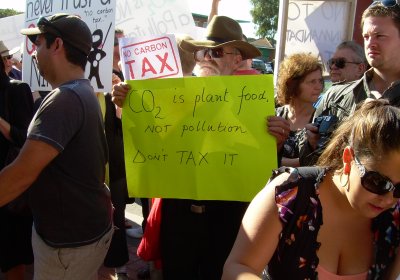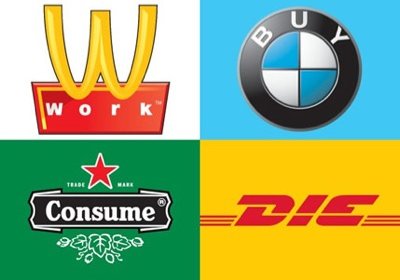“EPA: Extreme Pollution A-OK” read a banner held up by protesters outside Victoria’s Environmental Protection Authority (EPA) as it announced on May 20 a partial approval for the HRL Dual Gas project, which will use brown coal for electricity generation.
With a record 4000 submissions to the EPA opposing the project, the Stop HRL campaign group reacted with a spot protest outside the EPA during the announcement and a further protest of over 300 outside state parliament on May 24.
Ben Courtice
Global warming deniers are a dime a dozen in comments posted on the web.
From the ignorant to the willfully misleading, these deniers rarely manage to dent the confidence of someone with a good grasp of how the greenhouse effect works. But then, climate activists and scientists aren't their target.
Global warming deniers scream about the supposed lack of scientific facts and “proof”, but evidence continues to mount for global warming and its effects.
The casual observer might easily conclude that there are just two clear sides in the parliamentary debate over the Labor/Greens carbon price deal.
But there is a lot more to the debate than this.
Clearly the Greens are in favour, and appear to have won over PM Julia Gillard’s government to an interim carbon tax.
On the other hand, opposition leader Tony Abbott has promised a Tea Party-style uprising against it. Abbott will push to rouse a fascistic “people’s” movement to try to bury the deal.
In the space of a few weeks, Australia and the world have been rocked by devastating weather events, from huge snowstorms across the US to flash flooding and cyclones in Australia. Many of these events have not just been catastrophic, but have set new records for weather.
Let’s pause to list some of the recent extreme weather events in Australia:
· Serious and long-lasting floods in Queensland around Rockhampton.
· Unprecedented flash flooding in Toowoomba and the Lockyer Valley.
· The biggest floods on record in western Victoria.
· A 100-year record flood in Brisbane.
Many liberal environmentalists say that people must sacrifice some luxuries to save the environment and/or help the world’s poor. A more equitable sharing of the world’s resources means some will have to give up a bit.
For the well-off, sacrifice is like charity: giving up a few privileges to make themselves feel better. For such people, the idea of sacrifice tends to reinforce an elitist mentality.
But for poorer, working-class people, sacrifice has a different connotation.
Close to 5000 protesters took to the streets on November 6, demanding the next state government replace the Hazelwood power station with genuinely clean energy during the next term of office. Victoria goes to the polls on November 27.
Rally organisers said Hazelwood was the biggest emitter of greenhouse gases per unit of electricity of any power station in Australia. It is responsible for 3% of the nation’s entire carbon emissions. It’s also the nation’s largest emitter of dioxin, the most toxic known chemical compound.
Coal rules. That was the message delivered last week by the new Labor government.
Freshly appointed climate change minister Greg Combet began his ministership by telling the September 13 Australian: “The coal industry is a very vibrant industry with a strong future. What you've got to do is look to how we can achieve in the longer term things like carbon capture and storage for coal-fired power stations.”
On June 25, federal trade minister Simon Crean signed a deal to export up to 20 million tonnes of dried brown coal to Vietnam. The deal was signed with ironically-named Victorian company Environmental Clean Technologies (ECT). Fifty people protested outside the venue in Southbank where the deal was signed, despite the rain and only a few hours notice of the event.
On June 3, a small group of protesters educated Edgewater residents about the threat climate change poses to their suburb. Edgewater, one of Melbourne’s newest suburbs, could be partly underwater if climate change is not stopped. According to council data, 370 Maribyrnong homes were affected during floods in 1974.
The most serious controversy that has emerged in the climate movement this year is probably about the role of natural gas in a transition to a zero-emissions society.
The national climate summit in March did not debate gas, but decisions taken there have influenced the debate. A decision of that summit was to campaign to “replace Australia's dirtiest coal-fired power station, Hazelwood, with clean energy by 2012”.
Dozens of campaigners have hit Melbourne’s streets to campaign for the Hazelwood power station to be shut down. Climate action groups in the inner city are doorknocking thousands of homes every weekend to get the message across.
Hazelwood is Australia’s most polluting power station. Climate campaigners have targeted it with protests since the state government extended its operating licence until 2030. It was originally meant to be closed down and replaced in 2005.
I have been selected as the Socialist Alliance federal election candidate for the seat of Gellibrand in Melbourne’s western suburbs. I have spent much of the last 13 years as a union activist here, working in the manufacturing industry.
This is the “rust belt” — the old industrial heartland, and also one of the most ethnically diverse areas of the country.
- Previous page
- Page 9
- Next page










